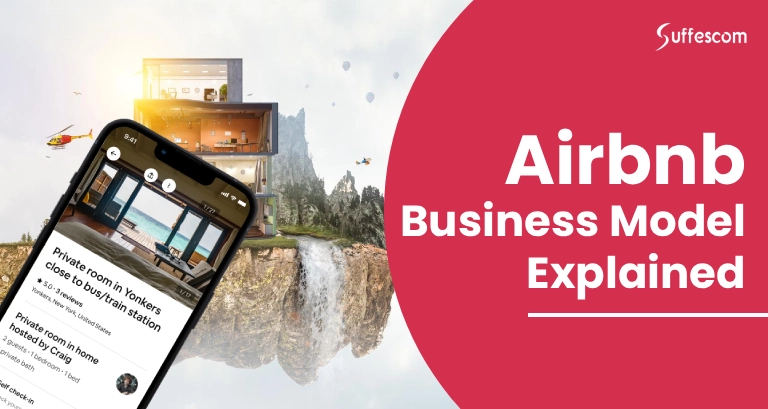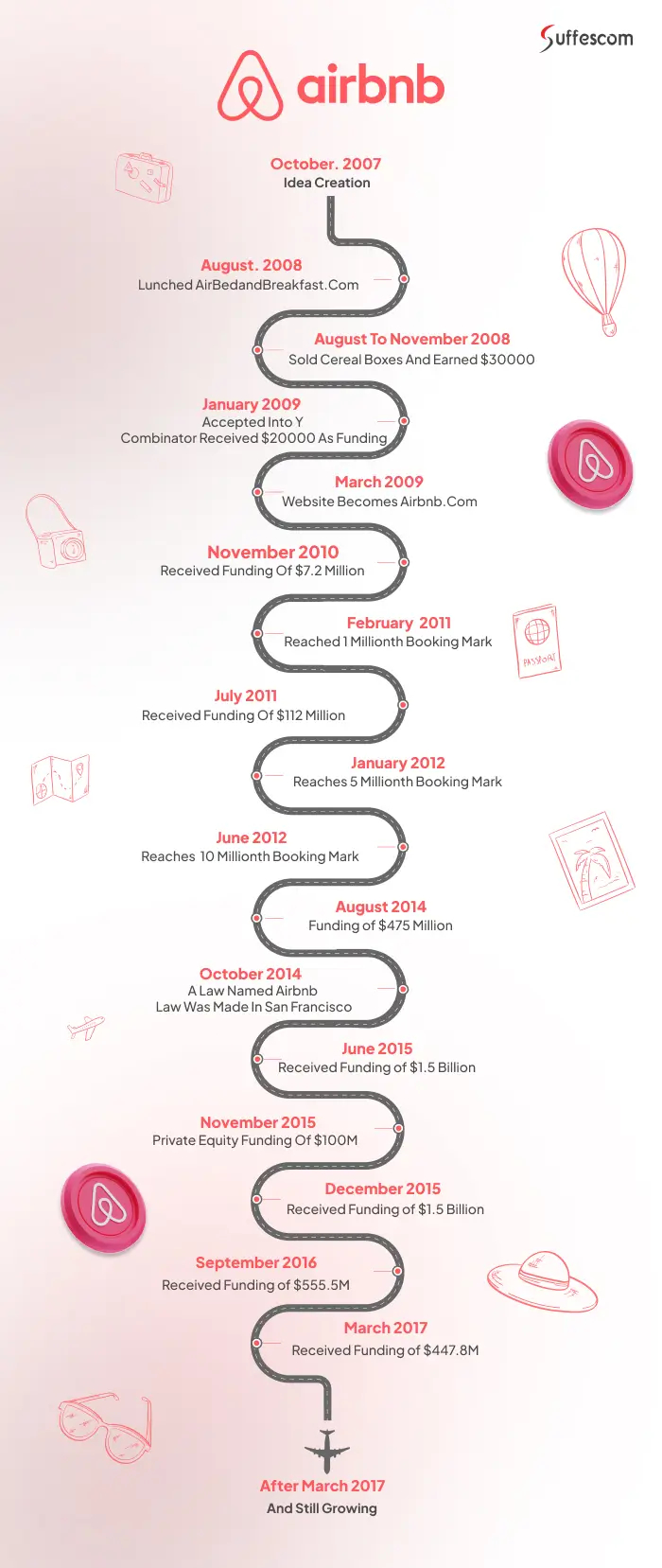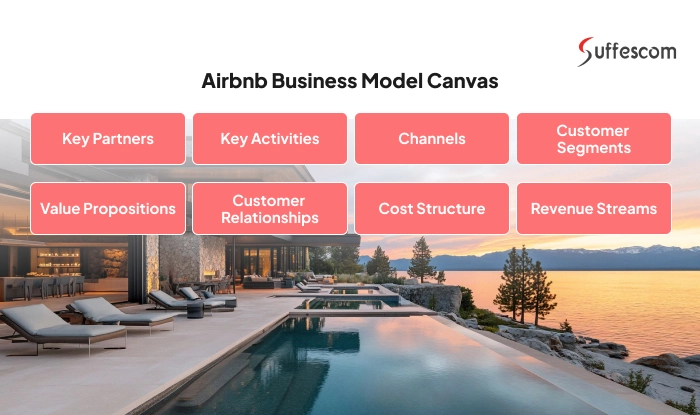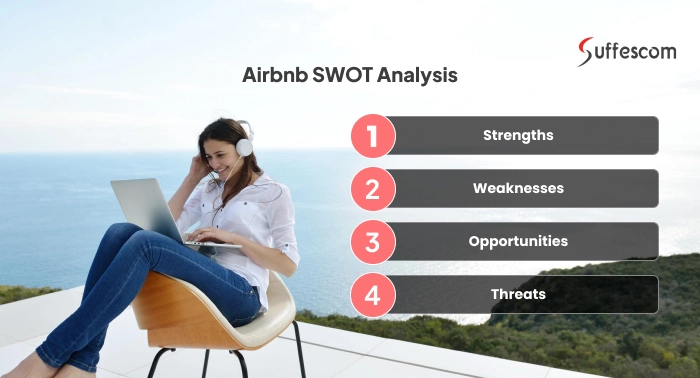Airbnb Business Model - How Airbnb Makes Money?

Airbnb has redefined the travel and hospitality industry, disrupting a centuries-old hotel model with a platform that connects people who have space to rent with those looking for accommodations. Since its inception in 2008, the company has transformed from a modest idea of renting out air mattresses to a multi-billion-dollar global brand. Today, Airbnb operates in over 220 countries and regions, offering millions of unique stays ranging from apartments and villas to castles and igloos. Its success stems from a combination of innovative business modeling, a keen understanding of user behavior, and an ability to adapt quickly to changing market conditions.
For entrepreneurs and developers exploring Airbnb clone opportunities or building a vacation rental app, understanding the Airbnb model is essential. This article will explore the details of Airbnb’s business model, revenue streams, operational approach, growth strategies, and competitive landscape. We will also go through unique insights about its success, challenges, and everything that other businesses can learn.
How Airbnb Scaled Globally: Key Stats, Business Model, and Major Wins

Airbnb’s rise to dominance was not accidental—it is the product of strategic expansion, user trust, and relentless innovation. These insights can be useful for those researching Airbnb clone software development or vacation rental app development.
Key Stats That Define Airbnb’s Growth:
- Over 4 million hosts worldwide.
- More than 7 million listings in 220+ countries and regions.
- Over 1.4 billion guest arrivals since launch.
- Market capitalization was around $80–$100 billion in recent years.
- Consistent growth in double-digit annual revenue after the initial public offering (IPO).
The Initial Concept:
The founders, Brian Chesky, Joe Gebbia, and Nathan Blecharczyk, originally created Airbnb to rent out air mattresses during a sold-out design conference in San Francisco. They quickly realized the scalability of connecting local hosts with travelers seeking more affordable, authentic stays, a principle that continues to inspire many Airbnb clone script projects today.
Major Wins That Fueled Growth:
- Leveraging professional photography to enhance the appeal of listings.
- Building a review system that increases user trust.
- Introducing “Experiences” to diversify beyond accommodations.
- Expanding into luxury rentals through Airbnb Luxe.
- Quickly adapting policies during the COVID-19 pandemic to retain users.
Airbnb’s Core Business Model: The Marketplace Approach
Airbnb operates as a two-sided online marketplace. On one side are hosts offering spaces; on the other side are guests seeking accommodations. Airbnb facilitates the transaction, manages payments, enforces policies, and provides dispute resolution.
For businesses considering Airbnb clone software development, this marketplace model is crucial—it’s asset-light. This means Airbnb doesn’t own the listed properties, allowing it to scale without the capital-intensive burden of real estate ownership. Its primary role is to provide the technology platform, trust infrastructure, and brand ecosystem.
Revenue Model: How Airbnb Makes Money?
Airbnb generates revenue primarily through service fees charged to both guests and hosts, combined with additional income streams from premium services and experiences. Its revenue model is simple yet highly scalable, and serves as a framework for Airbnb clone development cost estimations.
1. Guest Service Fees
Guests are charged a service fee ranging from 5% to 15% of the booking subtotal. This fee covers the cost of platform operations, customer support, and payment processing. The exact percentage depends on factors such as booking length, property type, and regional policies. Guest fees are Airbnb’s primary source of revenue, ensuring the company earns from every transaction on the platform.
2. Host Service Fees
Hosts pay a standard 3% service fee on each booking, which covers payment processing and platform services. Certain high-volume or premium hosts, such as Airbnb Plus listings, may have slightly different fee structures. This model ensures Airbnb earns revenue regardless of whether the guest fee fluctuates.
3. Airbnb Experiences
Airbnb Experiences allows hosts to offer activities such as city tours, cooking classes, or adventure trips. Airbnb charges a service fee of around 20% on these bookings. Experiences diversify Airbnb’s revenue, enhance user engagement, and increase the likelihood of repeat usage by offering a broader travel ecosystem.
4. Airbnb Luxe and Premium Services
Airbnb Luxe targets high-end travelers seeking luxury properties and personalized services. Airbnb charges higher commissions on Luxe bookings, creating a profitable revenue stream from premium offerings.
5. Additional Revenue Sources
- Currency Conversion Fees: Applied when bookings involve different currencies.
- Taxes and Regulatory Fees: Collected in regions where it is stated by law.
- Advertising and Partnerships: Airbnb occasionally generates revenue from strategic partnerships or promotional campaigns.
The Role of Hosts and Guests
The success of Airbnb’s revenue model depends on the interaction between hosts and guests. Hosts provide the supply of properties, while guests generate demand. This dynamic creates a network effect—more listings attract more guests, and more guests incentivize additional hosts to join, amplifying revenue potential.
Scalability of the Model
Because Airbnb doesn’t own properties, it can scale rapidly without significant capital investment. The revenue grows proportionally with booking volume, making the model highly efficient and sustainable.
Airbnb Business Model Canvas: A Complete Model Breakdown

The Business Model Canvas offers a structured way to understand Airbnb’s success:
- Key Partners: Hosts, payment processors, professional photographers, and local tourism boards.
- Key Activities: Platform development, marketing, trust and safety management, and customer service.
- Value Propositions: Affordable, unique stays; authentic experiences; and a global network of hosts.
- Customer Relationships: Peer-to-peer trust system via reviews, host support, and loyalty programs.
- Channels: Airbnb website, mobile app, social media, and partnerships.
- Customer Segments: Budget travelers, luxury travelers, digital nomads, and business travelers.
- Cost Structure: Platform maintenance, marketing campaigns, payment processing, and legal compliance.
- Revenue Streams: Service fees, luxury property commissions, and experience bookings.
How Airbnb Builds Trust and Stays Ahead of Competitors?
One of Airbnb’s most important differentiators is its trust infrastructure, which keeps users loyal and competitors at bay. Since Airbnb is a platform where strangers stay in each other’s homes, building confidence for both hosts and guests is critical.
1. Verified Identities
Airbnb requires both hosts and guests to verify their identities using government-issued IDs, social media accounts, or other verification methods. This reduces the risk of fraud, ensures accountability, and makes both parties feel secure when using the platform.
2. Reviews and Ratings System
Every booking includes an opportunity for both hosts and guests to leave reviews and ratings. This system creates transparency and builds trust, as future users can make informed decisions based on previous experiences. Hosts are given incentives to maintain high standards, and guests are encouraged to behave respectfully.
3. Secure Payment Processing
Airbnb handles all transactions through a secure payment gateway. Payments are released to hosts only after check-in, protecting guests from fraudulent listings while ensuring hosts receive guaranteed payment for legitimate bookings.
4. Host Guarantee and Insurance Programs
To mitigate risk for hosts, Airbnb offers programs like the Host Guarantee, which provides coverage for property damage, and Host Protection Insurance, which covers liability claims. These initiatives reassure hosts and encourage more people to list their properties.
5. Customer Support and Conflict Resolution
Airbnb provides 24/7 customer support to handle disputes, cancellations, or other issues. Effective conflict resolution maintains trust between users and reduces negative experiences that could drive people away from the platform.
6. Technology-Driven Safety Measures
AI and machine learning are used to detect suspicious activity, fraudulent accounts, or potentially unsafe bookings. This proactive approach strengthens the overall reliability of the platform.
Airbnb’s Competition Explained: From Big Brands to New Startups
Despite Airbnb’s global dominance, it faces competition from multiple directions, ranging from traditional hotels to emerging short-term rental platforms. Understanding the competitive landscape is crucial for evaluating Airbnb’s growth potential and strategic decisions.
1. Direct Competitors
These platforms operate in the same home-sharing or short-term rental space as Airbnb:
- Vrbo (Expedia Group): Focuses on entire-home rentals, appealing to families and larger groups.
- Booking.com: While traditionally hotel-centric, Booking.com now offers apartments, vacation homes, and other alternative stays.
- Plum Guide: Targets high-end, vetted properties with strict quality standards, competing in the luxury segment.
2. Indirect Competitors
These competitors include traditional hospitality providers or alternative travel solutions:
- Hotels and Boutique Chains: Established players offering consistent quality, loyalty programs, and business travel options.
- Regional Platforms: Platforms like Tujia (China) or OYO Rooms (India) focus on local markets, catering to regional tastes and regulations.
- Super-Apps: Apps like WeChat or Grab in Asia are beginning to integrate travel and accommodation services, increasing competition indirectly.
3. Emerging Threats
- Hybrid Models: Some hotel chains and serviced apartments now offer Airbnb-style services. These services offer flexible booking and personalized stays.
- Local Short-Term Rental Platforms: Smaller local players in specific cities or regions can capture market share, particularly among domestic travelers.
4. Airbnb’s Competitive Edge
Despite these competitors, Airbnb maintains advantages through:
- Trust and Safety Systems: Verified reviews, secure payments, and host guarantees.
- Global Brand Recognition: A widely recognized platform trusted by millions of travelers.
- Diverse Offerings: Airbnb Experiences, Luxe, and unique accommodations can differentiate your rental business.
- Network Effect: More listings attract more guests, and more guests attract more hosts, reinforcing market dominance.
Dreaming of the Next Big Travel App? Build Your Own Airbnb-Style Experience!
Airbnb Revenue Model: How Hosts and Guests Power Its Profit
Airbnb’s revenue model is fundamentally driven by its two-sided marketplace, where hosts provide listings and guests generate demand. Understanding this dynamic is key to seeing how Airbnb maintains profitability and scales globally.
1. Guest Service Fees
Airbnb charges guests a service fee ranging from 5% to 15% of the booking subtotal. This fee covers platform operations, customer support, and payment processing. The exact percentage depends on the total booking amount and the type of listing. By charging guests, Airbnb ensures a steady revenue stream tied directly to user transactions.
2. Host Service Fees
Hosts also contribute to Airbnb’s revenue through a standard 3% service fee for each booking. This fee covers payment processing and platform support. For certain hosts, such as Airbnb Plus or high-volume professional hosts, the fee structure may differ. The host fees ensure that Airbnb earns revenue regardless of guest charges.
3. Airbnb Experiences
Beyond accommodations, Airbnb offers Experiences, where hosts can provide activities like city tours, cooking classes, or adventure trips. Airbnb charges a service fee of around 20% for these bookings. Experiences not only diversify revenue but also increase user engagement, as travelers often book accommodations and activities together.
4. Airbnb Luxe and Premium Services
Airbnb Luxe targets high-end travelers seeking luxury stays, concierge services, and exclusive experiences. Commissions on Luxe bookings contribute to Airbnb’s profitability, allowing the company to capture higher-margin revenue from premium segments.
5. The Role of Hosts in Driving Profit
Hosts are critical to Airbnb’s success. The platform incentivizes them with global exposure, professional tools, and guarantees to attract and retain quality listings. A diverse, high-quality supply ensures more guest bookings, directly impacting Airbnb’s revenue growth.
6. The Role of Guests in Driving Profit
Hosts are critical to Airbnb’s success. The platform gives incentives to them with global exposure, professional tools, and guarantees to attract and retain quality listings. A diverse, high-quality supply ensures more guest bookings, directly impacting Airbnb’s revenue growth.
7. Network Effect: Supply and Demand Synergy
The relationship between hosts and guests creates a network effect. More hosts attract more guests, and more guests encourage additional hosts to join. This self-reinforcing cycle amplifies bookings and maximizes Airbnb’s revenue potential.
Airbnb SWOT Analysis

A SWOT analysis helps break down Airbnb’s Strengths, Weaknesses, Opportunities, and Threats to understand its business model and strategic position.
Strengths
- Global Brand Recognition: Airbnb is synonymous with home-sharing and is trusted worldwide.
- Asset-Light Model: The platform scales without owning properties, reducing capital expenditure.
- Strong Network Effect: More hosts attract more guests, creating a self-reinforcing growth cycle.
- Diversified Offerings: From budget accommodations to Airbnb Luxe and Experiences, the company caters to multiple market segments.
Weaknesses
- Regulatory Challenges: Short-term rental laws vary by city and can limit growth.
- Dependence on Travel Trends: Economic downturns or pandemics can reduce bookings.
- Host-Guest Disputes: Issues like property damage or unsatisfactory stays can impact trust.
Opportunities
- Corporate Travel: Expanding into business travel can increase consistent bookings.
- Luxury and Niche Segments: Airbnb Luxe and Experiences offer higher-margin revenue streams.
- Technological Innovation: AI, machine learning, and personalized recommendations can enhance user experience and drive engagement.
- Emerging Markets: Expanding in Asia, Africa, and South America presents untapped potential.
Threats
- Intense Competition: Platforms like Vrbo, Booking.com, and traditional hotels compete aggressively.
- Regulatory Crackdowns: Stricter laws in key cities can limit supply and growth.
- Market Saturation: Overcrowding of listings in certain cities may reduce profitability.
- Economic & Political Uncertainty: Travel restrictions, recessions, or geopolitical issues can impact bookings.
Airbnb’s Growth Strategies That Other Businesses Can Learn From
Airbnb’s scaling blueprint is a masterclass in digital business expansion.
Hyper-Local Market Entry:
Rather than launching generically in new countries, Airbnb tailors its marketing to local cultures and regulations.
Leveraging User-Generated Content:
Professional photos and guest reviews fuel organic marketing.
Diversifying Offerings:
Moving beyond stays to experiences, transportation possibilities, and event hosting.
Continuous Tech Investment:
AI-driven recommendations, fraud detection, and smart pricing algorithms.
Challenges Airbnb Faces in the Next Decade
While Airbnb has experienced tremendous growth, it faces several challenges that could impact its operations and long-term success.
1. Stricter Regulatory Environment
Many cities around the world are imposing stricter rules on short-term rentals to protect local housing markets. These regulations may limit the number of rental days, require permits, or enforce zoning restrictions. Airbnb must continue to work closely with governments and adapt policies to stay compliant while maintaining a large supply of listings.
2. Competition from Hotels and Emerging Platforms
Traditional hotel chains are increasingly adopting flexible pricing and digital booking strategies to compete with Airbnb. Additionally, regional or niche platforms, as well as super-apps in Asia, are entering the short-term rental market, intensifying competition. Airbnb must continue to innovate its services and maintain customer loyalty.
3. Balancing Affordability with Profitability
As Airbnb expands into premium offerings such as Airbnb Luxe, it faces the challenge of catering to high-end travelers while also focusing on budget-conscious users. Maintaining a balance between affordability and profitability will be key to sustaining diverse customer segments.
4. Sustainability and Environmental Concerns
Travel and tourism have a significant environmental footprint. Airbnb must address eco-friendly practices and promote sustainable travel options to meet the growing expectations of environmentally conscious travelers.
5. Maintaining Trust and Safety
As the platform scales, ensuring consistent safety, quality, and reliability becomes more challenging. Airbnb must continue to invest in technology, host training, and customer support to prevent incidents and maintain trust between hosts and guests.
6. Economic Fluctuations and Travel Trends
Global economic downturns, pandemics, or geopolitical issues can impact travel demand. Airbnb must remain agile, diversify offerings, and explore new markets to mitigate risks from fluctuating travel trends.
Key Takeaways From Airbnb Business Model
1. Two-Sided Marketplace
Airbnb operates as a platform that connects two main groups: hosts, who offer spaces for rent, and guests, who seek accommodations. The company does not own any properties itself. Instead, it provides the technology, payment processing, and trust systems to enable transactions. This model allows Airbnb to scale globally without the overhead costs of traditional hospitality businesses, making it highly flexible and efficient.
2. Asset-Light Scaling
Because Airbnb doesn’t own properties, it can expand into new markets rapidly. Unlike hotel chains, which require large investments in buildings, staffing, and maintenance, Airbnb’s growth depends mainly on attracting hosts and guests. This asset-light approach reduces financial risk and allows the company to scale globally while maintaining high profitability.
3. Trust Infrastructure
Trust is a key part of Airbnb’s success. The platform ensures safety and reliability through features such as verified IDs, guest and host reviews, secure payment systems, and host guarantees. This infrastructure builds confidence for both sides of the marketplace, encouraging repeat bookings and making Airbnb a preferred option for travelers worldwide.
4. Revenue Diversification
Airbnb has expanded beyond traditional accommodations to include Airbnb Experiences (like tours, classes, and local activities) and Airbnb Luxe for luxury travelers. By diversifying its offerings, Airbnb creates multiple revenue streams, reduces reliance on one type of service, and captures a broader share of the travel market.
5. Tech-Driven Edge
Technology enhances the efficiency of Airbnb’s platform. AI and machine learning optimize pricing, suggest listings tailored to guest preferences, and detect fraudulent activities. These technological capabilities improve user experience, increase bookings, and give Airbnb a competitive advantage over traditional hotels and smaller short-term rental platforms.
6. Local Adaptability
Airbnb customizes its strategy for each market. From localized marketing campaigns to partnerships with local photographers and compliance with regional rental laws, Airbnb adapts to cultural and regulatory differences. This local adaptability helps the company successfully enter diverse markets while maintaining a consistent global brand.
7. Regulatory Navigation
Airbnb faces legal challenges in cities with strict short-term rental regulations, such as New York, Paris, and Barcelona. To overcome this, Airbnb actively engages with policymakers, adjusts policies, and provides resources for hosts to remain compliant. Managing regulatory risks is crucial for maintaining market presence and long-term growth.
Want to Launch the Next Travel Sensation? Explore Development Costs for an Airbnb-Like App!
Conclusion
Airbnb’s journey from renting air mattresses to becoming a hospitality giant demonstrates the power of an innovative business model executed at scale. Its combination of a strong brand, trust systems, and diversified offerings has enabled it to thrive despite regulatory challenges and economic shifts. As it moves forward, its ability to adapt will determine its continued dominance in the travel industry.
FAQs
1. What is Airbnb’s primary source of revenue?
Airbnb earns mainly from service fees charged to both guests and hosts for every booking.
2. Does Airbnb own any of the properties listed?
No, Airbnb is an asset-light platform that connects hosts with guests.
3. How does Airbnb ensure trust between users?
Airbnb ensures trust through verified profiles, secure payments, reviews, and the host guarantee program.
4. Who are Airbnb’s main competitors?
Vrbo, Booking.com, traditional hotels, and regional platforms are Airbnb’s main competitors.
5. Can Airbnb’s business model work in other industries?
Yes, the peer-to-peer marketplace model adapts to various sectors, such as ride-sharing, freelance work, and equipment rentals.







